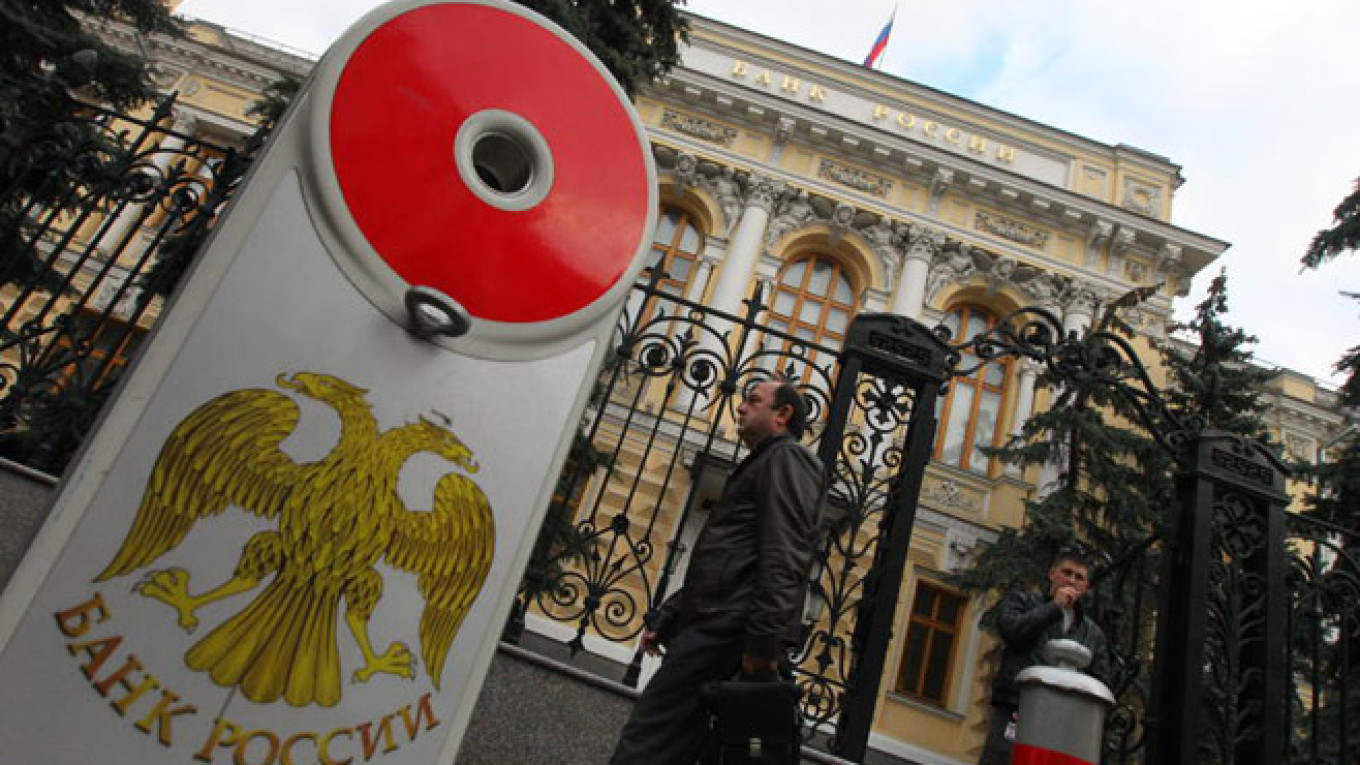The ruble sank to record lows against both the euro and the dollar Tuesday amid growing concerns over the Central Bank's policy of drawing down its foreign reserves to defend the country's beleaguered currency.
The Russian currency fell to 40.9 against the dollar in early evening trading, its lowest level since a traumatic 1998 restructuring, and dropped to 51.7 against the euro, a second historic low in two consecutive days.
Consistently butting at the upper end of the regulator-set trading corridor, the ruble's trajectory has caused the Central Bank to sell over $6 billion on currency markets since Oct. 6. While interventions have slowed the ruble's tumble, they have also generated questions about monetary policy.
"Analysts are debating whether the Central Bank should intervene more than its current policy allows or perhaps stop intervening amid claims that it is wasting its foreign currency reserves," according to Tom Levinson, a foreign-exchange strategist at Sberbank CIB in Moscow.
"If intervention continues at the current pace until year-end, Russia's foreign exchange reserves could fall by around another $40 billion," he said in written comments.
In a bid to decelerate the ruble's devaluation, the Central Bank has burned through $54.9 billion worth of foreign currency since the start of the year, leaving its reserves at a four-year low.
It has another $454.7 billion available, according to data on the regulator's website. Only about $220 billion of that, however, is a simple foreign currency stockpile, with the rest made up from gold reserves and rainy day oil funds controlled by the government, experts said.
With the ruble under pressure from falling oil prices and Western sanctions on Moscow, the Central Bank is currently spending its reserves at a rate similar to that of March this year when investors fled Russia as the Kremlin annexed the southern Ukrainian region of Crimea.
Russia drained about $200 billion of its foreign currency reserves in the 2008 financial crisis. In the lead up to Russia's 1998 default, the authorities spent all but $10 billion worth of the country's foreign currency reserves before abandoning their defense of the ruble.
The Central Bank is currently not facing any shortage of foreign currency, said Vladimir Tikhonov, chief economist at BCS Financial Group in Moscow, pointing to guidelines from the International Monetary Fund that suggests nations have reserves amounting to three months worth of imports. Today's levels of reserves are far above three months worth of Russian imports, which amount to about $75 billion, he said.
The Central Bank has said repeatedly it will implement a free floating ruble by the beginning of 2015, although some experts argue that continued ruble weakness could hamper this plan.
"The Central Bank has not been very lucky with the [timing of the] liberalization of the currency," said Sergei Kozlovsky, head of the analysis department at brokerage Grand Capital.
Current Central Bank policy states that the regulator will intervene on currency markets when the ruble passes the limits of a proscribed trading corridor, raising the boundaries by 5 kopeks every time it spends more than $350 million.
Questions about monetary policy have been raised by senior officials in recent days. Expectations are rising that the Central Bank will hike interests rates later this month in a move that could slow the devaluation of the ruble but might tip the Russian economy into recession.
Trying to influence the exchange rate would be pointless, German Gref, head of state-owned banking giant Sberbank, said Tuesday, according to RIA Novosti. "Holding the ruble at one level or another carries with it serious risks for the economy," Gref said.
Last week controversial Kremlin aide Sergei Glazyev called for the Central Bank to fix the ruble's exchange rate, and announce what it would be to the market two or three years in advance.
The ruble's trading corridor was moved at least once every day last week as pressure on the currency increased amid falling global oil prices. Brent crude shed 3 percent Tuesday, dropping to its lowest level since 2010 at almost $86 a barrel.
The Central Bank, which releases data on the corridor and the level of intervention with a time lag, said Tuesday that it had shifted the corridor by 10 kopeks the previous day.
The Russian Finance Ministry cancelled its first bond auction for almost a month Tuesday, according to a statement on its website citing unfavorable market conditions.
"There is nothing good ahead for the ruble," said analyst Kozlovsky. "While oil is falling and the conflict continues in Ukraine the ruble will continue to decline."
Contact the author at h.amos@imedia.ru
A Message from The Moscow Times:
Dear readers,
We are facing unprecedented challenges. Russia's Prosecutor General's Office has designated The Moscow Times as an "undesirable" organization, criminalizing our work and putting our staff at risk of prosecution. This follows our earlier unjust labeling as a "foreign agent."
These actions are direct attempts to silence independent journalism in Russia. The authorities claim our work "discredits the decisions of the Russian leadership." We see things differently: we strive to provide accurate, unbiased reporting on Russia.
We, the journalists of The Moscow Times, refuse to be silenced. But to continue our work, we need your help.
Your support, no matter how small, makes a world of difference. If you can, please support us monthly starting from just $2. It's quick to set up, and every contribution makes a significant impact.
By supporting The Moscow Times, you're defending open, independent journalism in the face of repression. Thank you for standing with us.
Remind me later.


